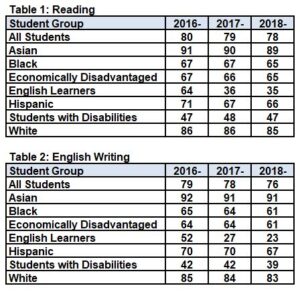The Virginia Department of Education has released the results of the Standards of Learning (SOL) tests for the 2018-19 school year. While changes to the test methods make it difficult to make valid comparisons for math and history/social sciences, reading and writing test scores declined somewhat, most markedly for blacks, students with disabilities, and economically disadvantaged students.
Here are the top-line results for the state:
- Reading: 78% pass rate, down 2 percentage points from the previous year.
- Writing: 76% pass rate, down 2 percentage points.
- Math: 82% pass rate, up 5 percentage points.
- Science: 81% pass rate, unchanged
- History/social science: 80% pass, down 4 percentage points
Asians, as usual, out-performed all other racial/ethnic groups, followed by whites, Hispanics, and blacks. Despite a heavy emphasis by the Northam administration to address racial inequities in schools, the black-white achievement gap grew wider last year in reading and writing, while remaining the same for science.
VDOE instituted two main changes to its testing. First, it reduced the number of tests high school students must pass to graduate. Under the revised regulations, explains the VDOE press release, “students who meet the testing requirement in a content area do not have to take another test in the subject unless additional testing is required for the school to comply with federal testing requirements. Previously, high school students continued to take end-of-course tests even if they had already earned the credits in the content area necessary to graduate.”
“The reduction in high school testing is most apparent in history where there is not a federal requirement that students take at least one test in the subject in high school,” VDOE spokesman Charles Pyle told Bacon’s Rebellion. The Every Student Succeeds Act “requires that students take at least one test in reading, math and science during high school.”
Second, VDOE introduced new tests and standards for math. Some educators have expressed concern that the math standards were watered down. (See “Did the State Reduce the Rigor of Math SOLs?”)
School Superintendent James Lane said VDOE staff will collaborate with school divisions to address the achievement gaps in reading, especially in the elementary grades. VDOE will work with schools and divisions that did not see declines in reading performance in order to identify best practices and successful strategies for improving reading skills. The effort will include a review of the effectiveness of interventions to assist young readers not reading at grade level.
“School divisions must ensure that all children receive research-based reading instruction — beginning in kindergarten — that addresses their specific needs, and that students are reading at grade level by the end of the third grade,” Lane said. “This includes making sure that students read a variety of challenging content, including non-fiction and literature that expands vistas and vocabularies. We must meet students where they are, but we must also move them to where they need to be: reading at grade level or above and ready for success in the 21st century.”
Update: Here is John Butcher’s take on the City of Richmond data.



